Forecast: snow, snow and snow
Updated: 2015-06-25 00:58
By Sun Xiaochen(China Daily)
|
||||||||
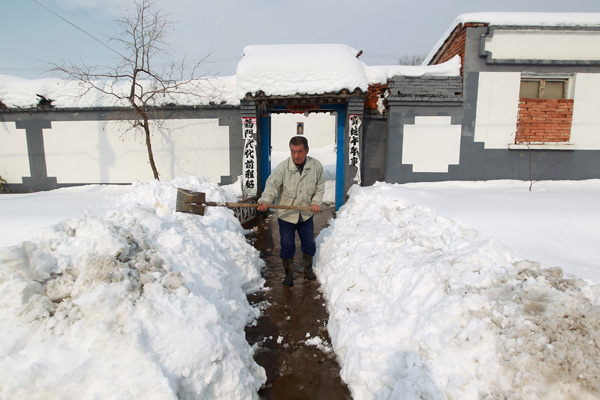 |
|
A local cleans heavy snow in front of his house in Yanqing county, northwestBeijing, a proposed venue for the 2022 Winter Olympics. Zhu Xingxin / China Daily |
Weather experts say the proposed Olympic venues will be sufficiently covered, Sun Xiaochen reports.
Beijing has sufficient natural snowfall to ensure that skiing events in the mountainous venues proposed in the city's 2022 Winter Olympics bid can go off without a hitch, meteorologists have said.
The race to host the Games is now in its final stage, with the Chinese capital going head to head with Almaty in Kazakhstan. The International Olympic Committee will announce the winning bid on July 31.
Beijing's ambitious bid has drawn close attention from around the globe, and has won praise from many quarters. However, some critics in the international media say that the relatively dry winters in North China could mean a shortage of natural snow for the Games.
Meteorologists have shrugged off such concerns. Citing the specific climate conditions in the mountains of Beijing's northwest Yanqing county and partner city Zhangjiakou, in Hebei province, where the events will be held, weather experts say organizers can expect abundant snowfall in 2022.
"As it is in the semi-humid, continental monsoon zone, Yanqing's meteorology conditions are preferential for snowfall in the winter, as it has the right humidity and low temperatures," said Wang Ji, director of the Beijing Climate Center. "These conditions are very different from those in downtown Beijing. Although Beijing doesn't see that much snow in winter, the county consistently sees snowfall in its mountainous regions, where snow can be maintained for as long as 140 days."
According to the 2022 Beijing bid committee, events in alpine skiing, bobsled, luge and skeleton will be staged at purpose-built venues about 6,880 feet above sea level in Yanqing's Xiaohaituo Mountain, 43 miles northwest of downtown Beijing.
The other snow events, such as freestyle skiing, biathlon and Nordic combined, will be staged at refurbished venues in Zhangjiakou's Chongli county, which is about 124 miles northwest of downtown Beijing.
Based on meteorological data collected over the past decade, analysts forecast that the average temperature in Yanqing during the 2022 Winter Olympics and Paralympics, from Feb. 4 to March 13, would range from 16 to 30 degrees, while the average natural snowfall is forecast to reach 8 inches.
According to the Beijing Meteorological Service, statistics suggest it is also "highly possible" that snowfall will increase between now and 2022 because annual snow depths have been growing at a steady rate in recent years.
In Zhangjiakou, where four commercial ski resorts have developed 82 trails since 1996, snow fell 26 times between November and April, which the Beijing 2022 Olympic Winter Games Bid Committee says is proof of sufficient natural snowfall.
"All seven (Olympic winter sports) federations have given positive feedback on our planned venues during on-site inspections between July and November last year," said Zhao Yinggang, deputy secretary-general of the committee. "This means we're OK to host all the sports."
In addition to these assurances, ski industry insiders have emphasized that artificial snow has always been the No 1 choice for paving trails used in high-level competition such as the Winter Olympics, even in places with abundant natural snowfall.
"The International Ski Federation requires all competition and training courses to use artificial snow because it's more resistant to warm weather and gives recommended density for competitive skiing," said Mojca Ogris-Schimberg, a senior manager at Demaclenko, a company that plans, develops and produces snow-making systems for resorts worldwide. "Therefore, a lack of natural snow is not a problem in the preparation of Olympic slopes."
Demaclenko has developed training and competition slopes for international events, including the world championships in Austria in 2001 and Germany in 2011.
Patrick Danielsson, general manager of Italian snow-makers TechnoAlpin's China branch, agreed that natural snow does not matter as much as expected for major events.
"No international competition takes place today without man-made snow, no matter where, even in heavy-snowing countries such as Norway," said the Italian, who grew up in a town at the foot of the Alps.
"It's a misunderstanding that to host the Olympics you need to have enough natural snow. In fact, natural snow is of low quality. For high-level downhill racing, natural snow is not wet enough, so artificial snow is widely used at resorts everywhere in the world."
Ogris-Schimberg and Danielsson dismissed concerns over Beijing's use of snow-making systems at proposed Olympic venues, saying it is international practice.
"Personally, I think China — especially Beijing, with its mountainous surroundings — is an ideal place to host the Winter Olympic Games," Danielsson said. "First, there are a lot more professional skiers in China than a few years ago. Now, many people go on ski trips on a regular basis. The skiing culture is forming up here.
"I also think that if the Olympics takes place in Beijing and Zhangjiakou, it will really help to promote winter sports and their traditions in China, which is a very important aspect."
According to the bid committee, about 408,700 tourists visited Yanqing for winter-related activities last year, and it forecasts the 2022 Games would attract 1.35 million people.
After the Games, part of the skiing facilities to be built in Yanqing would be converted for commercial use and opened to skiers in winter, as well as mountain climbers and cyclists in summer, the bid states.
The IOC issued its 2022 Evaluation Commission Report this month after visiting the two candidate cities for on-site inspections. Although largely positive toward Beijing's bid, the feedback did cite the potential environmental impact on the city's reservoirs and eco-system.
Representatives from both the Zhangjiakou and Yanqing operation centers have vowed to ensure local ecosystems are protected during the construction of Olympic venues and facilities.
- Injured ROK tourists in intensive care
- 36 dead, 26 missing after banca capsized in C. Philippines
- Thai navy plans to buy three Chinese subs
- Mass casualties in Indonesian military plane crash
- Japan's LDP lawmaker denounces Abe's security policies
- More than 100 feared dead in Indonesian military plane crash
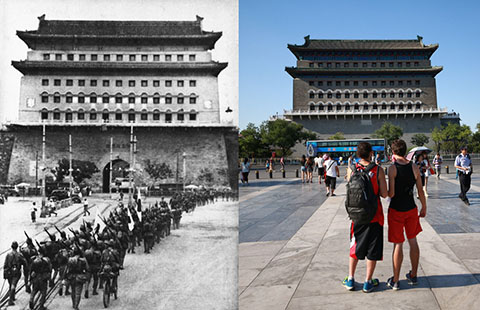
 Then and Now: Beijing’s historic sites as witnesses of war
Then and Now: Beijing’s historic sites as witnesses of war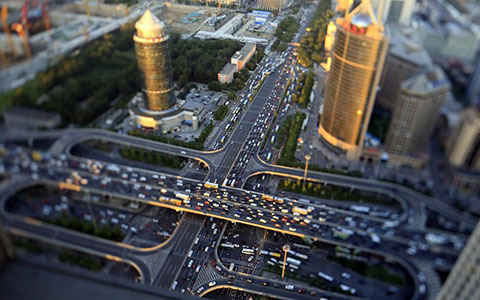
 In photos: China from above
In photos: China from above
 Serena Williams beats sister Venus to reach last eight
Serena Williams beats sister Venus to reach last eight
 Culture insider: Six things you may not know about Minor Heat
Culture insider: Six things you may not know about Minor Heat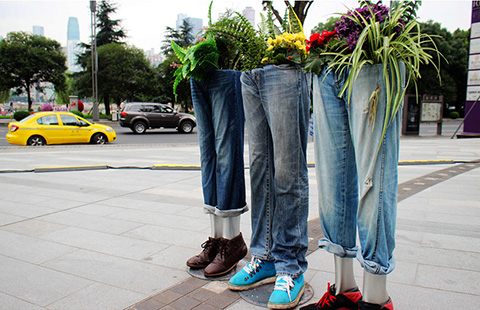
 Fancy sculptures sparkle in Chongqing
Fancy sculptures sparkle in Chongqing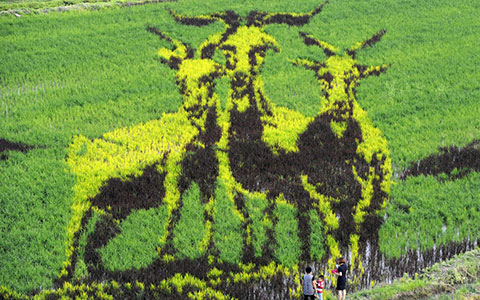
 Ten photos you don't wanna miss - weekend special
Ten photos you don't wanna miss - weekend special
 US beat Japan 5-2 to win Women's World Cup
US beat Japan 5-2 to win Women's World Cup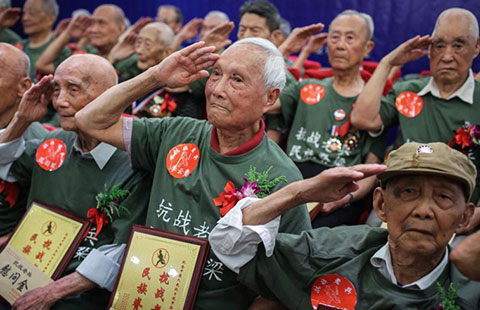
 Veterans of World War II honored
Veterans of World War II honored
Most Viewed
Editor's Picks

|

|

|

|

|

|
Today's Top News
China shares listed in US see selling
China answers Clinton charges
President Obama addresses IS threat
China has ability to deal with risks to economy: premier
Govt prefers peaceful means in resolving maritime row: Envoy
China predicts Greece to stay in eurozone
Chinese stocks struggle to maintain rally in afternoon
Greece enters uncharted territory after referendum 'no' vote
US Weekly

|

|







